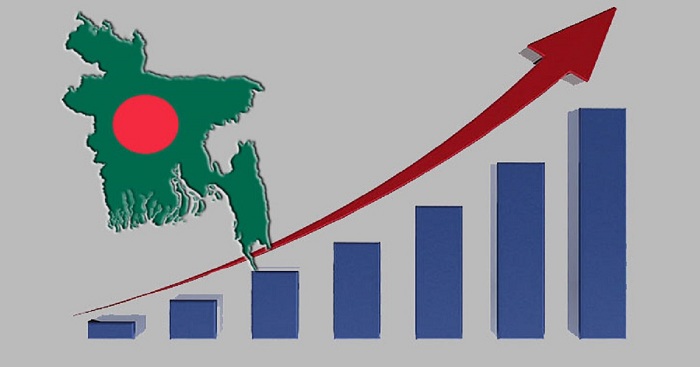2019: Bangladesh also hit global headlines with good news

There is a say in journalism that ‘bad news is good news’. Not always, anyway. Bangladesh hogged headlines for many good reasons in the outgoing year - 2019.
The Asian Development Bank (ADB) ranked Bangladesh as the fastest-growing economy in the Asia-Pacific region, outshining China, Vietnam and India.
Hundreds of news were generated throughout the year – both locally and globally-- on Bangladesh’s fastest-growing economy as in previous years.
Economic Growth
From a country dubbed as a ‘basket-case’ in the 70s, Bangladesh has become one of the world’s greatest economies in terms of growth and the country recorded an estimated 8.1 percent GDP growth in 2019.
The country has achieved near self-sufficiency in food production for more than 166 million people. The per capita income has risen nearly threefold since 2009, reaching US$1,828 this year.
The number of people living in extreme poverty -- classified as under $1.25 per day -- has shrunk from about 19 percent of the population to less than 9 percent over the same period, according to the World Bank.
From a small-sized budget of Tk 786 crore in FY 1972-73, Bangladesh unveiled a budget of Tk 523,190 crore in 2019-20 fiscal year indicating how its economy has advanced over the years.
The contribution of about 2.5 million Bangladeshi overseas workers props up the economy with remittances that soared to US$ 15 billion in the last completed fiscal year.
Now the country is now globally said as case of ‘Development Miracle’.
Bangladesh has also climbed up a spot to 135 among 189 countries in the 2019 human development index, according to a report by the United Nations Development Program. It can be termed impressive as it is almost matching the performance of neighbouring countries -- India (130) and Bhutan (134), and leaves behind others like Myanmar (145), Nepal (147), Pakistan (152) and Afghanistan (170) in the region.
According to World Bank data, in 1960, Bangladesh and Pakistan had the exact same fertility rate of 6.725 children per woman and India had 5.9. In 2017, Bangladesh had a 2.1 fertility rate, while India had 2.2 and Pakistan had 3.6.
The dramatic drop in the fertility rate was the result of strong and persistent government commitment to innovative, multi-layered programmes such as family-planning and nationwide campaigns, with the involvement of NGOs and even religious leaders. Contraceptives were widely advertised and made available at low-cost, subsidised prices.
The number of premature death of infants has come down substantially. From 150 infant deaths per thousand in 1971, it has been reduced to 32.4 in 2017, according to Unicef.
The life expectancy has also grown to 72.43 for Bangladesh as of 2019, while it was 69.50 for India and 67.17 for Pakistan.
Rohingya Issue
Bangladesh drew the global attention when the top UN court - International Court of Justice (ICJ) - heard the genocide case filed by The Gambia against Myanmar.
The hearing was held at the Peace Palace in The Hague on December 10-12 when the UN court was asked to accord provisional measures to bring relief to the Rohingya community and end the prevailing culture of impunity of the perpetrators in Myanmar.
On November 11, The Gambia filed the case with the United Nations’ highest court, accusing Myanmar of committing genocide in its campaign against its Rohingya Muslim minority.
Bangladesh appreciated the accountability efforts at the ICJ lodged by The Gambia on crimes committed on Rohingyas allegedly with genocidal intent by Myanmar.
Bangladesh also underscored complementarities between accountability and creation of an atmosphere conducive to sustainable repatriation of Rohingyas.
In 2017, Myanmar’s military, police and local militia burned Rohingya villages, “systematically shot and killed” Rohingyas and committed acts of sexual violence and rape – used as a weapon of war – against women and girls.
Sports
Bangladesh set a record in clinching 19 gold medals in the South Asian Games improving the tally from the 18 earned in 2010 in Dhaka.
The clean sweep in archery with 10 gold medals along with the success of the karatekas and weightlifters enabled Bangladesh to make history in Nepal.
Celebrated archer Mohammad Ruman Shana and Eti Khatun displayed a brilliant show in archery securing three gold medals each -- two in team events each and one in singles event -- in the Nepalese tourist town of Pokhara.
Famed lifters Mabia Akhter Simanta and Jiarul Islam bagged two gold medals in weightlifting events while Fatema Mujib clinched the first-ever gold medal for Bangladesh in women’s fencing at Kirtipur Covered Hall in Nepalese capital of Kathmandu.
Bangladesh’s athletes also clinched three gold medals in Kumite events of Karate and Dipu Chakma won gold medal for Bangladesh in Taekwondo.
